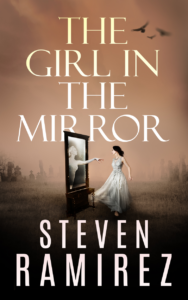Please welcome Steven Ramirez to TKZ!
If, as Stephen King likes to say, the road to hell is paved with adverbs, then finishing a novel is paved with mouse traps; and here you are trying to get across that minefield in your bare feet.
As writers, we tend to get distracted—a lot. Thanks, Netflix. And then, there’s life. How many of you have said, “If only I could focus exclusively on my writing, I’d finish this damn book, by cracky.” I know I have. Repeatedly over the years, much to the irritation of my long-suffering wife.
Then, a little thing called COVID-19 happened. We were told we had to shelter in place. Sure, there was still Netflix and Amazon Prime to distract us, but we couldn’t go anywhere. What’s a writer to do? Well, like the wily poker player whose bluff was called, I decided to shut up and write. And guess what, I finished the damn book.
Pantsers Are People, Too
I’m a pantser by trade. That means I don’t have a clue where I’m heading when I begin a new book. That’s not entirely true. I do know where I would like to end up, but I haven’t worked out the details. I have a main character in mind, of course. And I’m pretty clear on the conflict arising between the MC’s goal and the thing standing in the way. Other than that, I’m free as a bird when it comes to the plot. I suspect that some plotters look at pantsers as undisciplined children with uncombed hair and sticky fingers. My image of a plotter is a person who dresses impeccably and has an English accent. Borrowing from the wonderfully insane film Galaxy Quest, plotters are Alexander Dane, while pantsers are Jason Nesmith.
The book in question is the third in my supernatural suspense series, Sarah Greene Mysteries. My main character sees ghosts, which tends to get her into serious trouble. Over the course of the three novels, Sarah goes from discovering a mirror that holds the spirit of a dead girl to the entire town pretty much erupting into flames.
Now, as a card-carrying pantser, I had no idea how I was going to go from a murder mystery to Armageddon. I had to trust that the characters would get me to my destination. Spoiler alert—going about crafting a novel this way requires you to rewrite. Often. That’s the downside. The upside is, there are lots of opportunities for discovery. And then, there is what I like to call the happy accident, which in my opinion, is a gift from heaven and makes for a better story.
Brain Teasers
I’m no psychologist, but I suspect that somewhere deep in the nooks and crannies of my brain is THE STORY. By the way, can you even have a nook without a cranny? Just wondering. Anyway, like a sculptor working a block of marble, my job is to remove everything that isn’t the story. I’m pretty sure this is easier for plotters. I’m guessing they sit down and chisel out the plot until it operates like a Swiss watch. That’s just not for me.
“So, what about writer’s block, Mr. Too-Busy-To-Be-A-Real-Writer?” you say. Well, I don’t believe in it. Sure, there are times when we get stuck. But guess what. Even when the words are not flowing onto the page, your brain is working on the story. Maybe not consciously. But, trust me, you’re still writing. My belief is, once we can accept that not all writing translates into words on paper, the more relaxed we become. I was going to say happy, but whoever heard of a happy writer, am I right?
When I get stuck, I set aside the manuscript for a few days and either work on something else (and you should always have something else to work on) or watch television. While my conscious mind is laughing its butt off at The Good Place, my unconscious is free to work. In fact, my psyche—whose name is Stan, by the way—was probably praying I would stop looking over his shoulder and vacate the room so he could get back to creating. Stan does tend to get irritable. But I don’t blame him. I mean, I’m no picnic. Ask my wife.
Survey Says
So, where does all this leave us in terms of writing while sheltering in place? Well, when things happen that are beyond our control, we are presented with choices. I suspect that many of you out there took a look at the situation and, like me, wrote like the wind these past few months. Maybe you didn’t finish your book, but I’ll bet you made significant progress.
But what do we do when life returns, more or less, to normal? With luck, we’ve developed the discipline to carve out time each day to write. And that, my friends, is a happy accident.
TKZers: As writers, what are some of the ways you have taken advantage of these pandemic times?
 Steven Ramirez is a 2019 Best Indie Book Award (BIBA) winner and a 32nd Annual Benjamin Franklin Award Silver Winner for The Girl in the Mirror, the first novel in the supernatural suspense series Sarah Greene Mysteries. A former screenwriter, he also wrote the acclaimed horror thriller series Tell Me When I’m Dead and Come As You Are, a horror collection. Steven lives in Los Angeles.
Steven Ramirez is a 2019 Best Indie Book Award (BIBA) winner and a 32nd Annual Benjamin Franklin Award Silver Winner for The Girl in the Mirror, the first novel in the supernatural suspense series Sarah Greene Mysteries. A former screenwriter, he also wrote the acclaimed horror thriller series Tell Me When I’m Dead and Come As You Are, a horror collection. Steven lives in Los Angeles.
 The Girl in the Mirror: A Sarah Greene Supernatural Mystery
The Girl in the Mirror: A Sarah Greene Supernatural Mystery
While renovating an old house, Sarah Greene finds a mirror holding a dead girl’s spirit. As she explores the house’s secrets, Sarah awakens dangerous dark forces that could harm her.
Available now at Amazon.


Thanks for guesting at TKZ today, Steven. That was a fine defense of pure pantsing, so much so that you almost have me convinced that pantsers are, indeed, people too. And using Galaxy Quest as our standard (and who wouldn’t?) I view pantsers more as Guy Fleegman, always wondering what’s happening and occasionally screaming in horror. (He does, however, make it to the end in fine shape.)
Re: writing as a way of getting through all this. I agree. I endorse “morning pages” as a way to grease the day’s wheels. Or the novel journal, an idea I got from Sue Grafton, where you talk a bit to yourself about the WIP and what your life is like at the moment.
Then, of course, you get to your outline and write the next scene in your book. Ha!
Plotter or pantser, do finish. Always finish. “Never give up, never surrender!”
That was a fine defense of pure pantsing, so much so that you almost have me convinced that pantsers are, indeed, people too.
Hahahahaha. *snort*
That’s okay, Sue. I’m used to it. 🙂
Me, too, Steven. Fie on them, I say. At least I have pants. 😉
Welcome!
Glad to be of service, Jim. But Guy Fleegman? Ouch. 🙂
Hi, Steven
Welcome! This was a great post. Once upon a time, I was a pantser as well, then I moved over to the outlining side of the fiction writing force. These days, I’m working to find a middle ground. Even as an outliner, there’s a lot of truth for me in your description of carving away the marble to find the story.
For me, the pandemic followed closely on the heels of my retiring from the public library, after thirty plus years working there and writing on the side. Finally I could go full time, and then lock down. Well, I certainly was planning on staying home more, maybe not quite this much, but still. In addition to finishing the fifth and final book in my Empowered series, I began work on a long-time passion project, namely a library mystery.
Before my retirement I’d polled friends, both those who’d retired and others who wrote full time, for their advice on how to deal with retirement and going full time as a writer. Almost all said, set a schedule. They were so right.
Loved your guest post! Hope to see you here again soon.
Steven is always great fun, isn’t he? You should read our messages in our private Twitter group. He’s got quite the sense of humor!
Thanks so much, Dale. I had fun. And congrats on finishing your novel. Can’t wait for your library mystery!
Thanks for being my guest today, Steven! Great to have you here on TKZ.
Welcome, Steven! (Didn’t get a TKZ email this morning, so had to find your post on my own.)
Pantser all the way. I get the idea, write the first line, then, hopefully, my character(s) take over and I just scribe. After I get the first draft spruced a bit, then I outline the scenes…helps me to see where the opportunities are, as well as the “problem children”.
My life hasn’t changed that much during this *brief* life situation. Brief being an optimistic word. I’m retired, so my schedule is much the same. The only difference is I have to fight harder to stay optimistic, what with bad news screamed around every corner. I carry a big mallet to beat the nay-sayers (virtually, of course) over the head.
Deb,
Needless to say, I had no idea when I retired last December we’d be in the midst of a pandemic by my birthday this March. It might not feel like it, but my wife (who retired last June) and I remind ourselves we are fortunate, even as we must stay at home. I, too, struggle with staying optimistic, but, there’s reason to be. Humans endure.
Remembering Jim’s comments in the past, here and in his books, on the value of Stoic philosophy, I found a new book, “How to Think Like A Roman Emperor: The Stoic Philosophy of Marcus Aurelius,” and am fifty plus pages in (it’s a short book). The book is just what we need right now. Marcus ruled during the devastating Antonine Plague of the late 2nd century, so he’s been where we are now.
Hang in there!
Thanks for the encouragement, Dale! I retired March 2019, but worked on call a lot, so it hasn’t felt like retirement until this year. Now it’s for real, since I just hung up my career in medical administration for good this year.
For me, it’s all about setting a schedule. I don’t want to be that gal who watches *gasp* TV during the day of all things. I want to be that author who practices carper typem.
Speaking of…
I want to be that author who practices carper typem.
Hear hear! That’s the perfect mindset to achieve your goals, Deb. Sorry about the lapse in notifications. You may receive two posts in one notification tomorrow. Ugh. Classic Monday “technical difficulties” behind the scenes. 😉
You’re right, Deb. The key is to stay focused. The other side, of course, is to find a balance. Jim made a very good point about morning pages. That leaves time for enjoying other things. Best of luck with your projects. Go pantsers!
Welcome to TKZ, Steven!
Your discussion of “Stan” is the key, I think, to why pantsers can start a story where they don’t know the end and successfully complete it. You have faith in your subconscious/psyche to guide you along. The more in touch a writer is with his/her subconscious, the more it will provide answers–although not always in the order or form you expect them.
My mentor Dennis Foley says the subconscious is like a seven-year-old girl who brings you “gifts”–random thoughts that may seem totally irrelevant to your story at the time. If you dismiss the gift/idea, you hurt her feelings and she withdraws. If you appreciate her ideas–even though you’re not always sure what to do with them–she’s thrilled and will bring you more.
Then a moment of epiphany comes later when you realize one of her gifts clicks exactly into place in your story.
The pandemic has turned all of our lives into an exercise in pantsing b/c we have no idea what comes next and there’s no outline to guide us through.
Hope to see you again at TKZ, Steven!
So true, Debbie. Love the “gifts”!
Thanks so much, Debbie. A seven-year-old girl indeed. Over the years, I’ve learned not to ignore her gifts. I’ve found that, even if these nuggets don’t fit into what I’m currently writing, they might be perfect for a future story. That’s why I write them down.
Welcome to Killerzone, Steven. I am the resident annoying contrarian. Every blog needs one, and I do my humble best.
I mix plotter and pantster. I have all the major plot points and my end game figured out and come up with the rest as I move forward. Anyone with some element of plotter has much less work in the rewrite stage, and those on a contracted schedule for a book aren’t as prone to panic attacks because the book rarely moves off course. Most of my professional writing friends of many years had to learn to be a partial or full plotter for that reason.
And, yes, your subconscious knows more than it is telling you. During my first rewrite, I’ve always been astonished to find bits of setup and character backstory seeded through the story that I didn’t think I had come up with far in to the book.
Thanks, Marilynn. Over the years, I’ve moved a little more toward the plotter side (don’t tell Stan!). I still don’t create a full outline, but I do make notes similar to what I used to do when I wrote screenplays. I agree, a mix of both styles is very effective.
One thing I didn’t mention in the post: I tend to do research as I go. I wonder how others are handling that.
For me, it’s how important the research is. If it’s minor points, research on the fly is fine. If it’s essential to the whole story, I do a lot of research before I write the first word. I’ve learned some amazing things during the early research phase which has enriched and changed the book itself.
In ancient times before Internet research, I was going through the local library’s collection on the flora of South America because an important character was a ethnobotanist, and I found a book on the Confederate survivors who left the US to live in Brazil. Suddenly, I not only had major plot points but a country I created for the plot to unfold. The research gods are as kind as the Muses at times.
Pingback: Pantsing through the Pandemic – Steven Ramirez, Author
Agreed, Marilynn. Deadlines won’t wait for inspiration to strike. I’d go into panic-mode without a solid plan in place.
Thanks Steven, for championing the pantser life!
I’ve also finished writing my book during lockdown. I’ve always been a pantser but now, staring down the barrel of some fairly major stuctural editing, I’m considering a more hybrid approach in future. Plantser I guess. Less planning than creating a structure that I can drop my wild, pantser words into.
(Similarly – don’t tell the guys in my writer’s group, or I’ll never hear the end if it!)
Glad you enjoyed the post, J. A. Steven’s a fun guest. ?
Glad you enjoyed the post, J.A. I suppose if I had a publisher, I would have to bite the bullet and defect to the plotter side to meet my deadline. That said, I do see value in a hybrid approach. But please, let’s not agree on “planster.” I’ll have to move my office into a greenhouse!
Lol!
“…not all writing translates into words on paper.”
Amen, Steven! Truer words and all that.
And obviously I need to go back and watch Galaxy Quest again
Ha! You and me both,Justine.
Justine, there’s also a wonderful documentary on the making of ‘Galaxy Quest’ on Amazon Prime called ‘Never Surrender: A Galaxy Quest Documentary.’ That story is almost as entertaining as the movie itself.
Thanks, Steven! Will check for that.
This pantster-plotter thing – I’m like the grunge guy you see with his jeans halfway down and his boxers exposed. The more I do this the less I know what I am.
Thank you, Steven.
As another Steven who is a pantser, I especially appreciated discovering that I’m not so alone. Though how you knew I had mussed hair and sticky fingers I’ll never figure out.
Glad to know you’ve got a pantser’s ‘The End’ from the pandemic.
Thanks so much, Steven. Best of luck with your projects.
Pingback: Top Picks Thursday! For Writers & Readers 06-25-2020 | The Author Chronicles